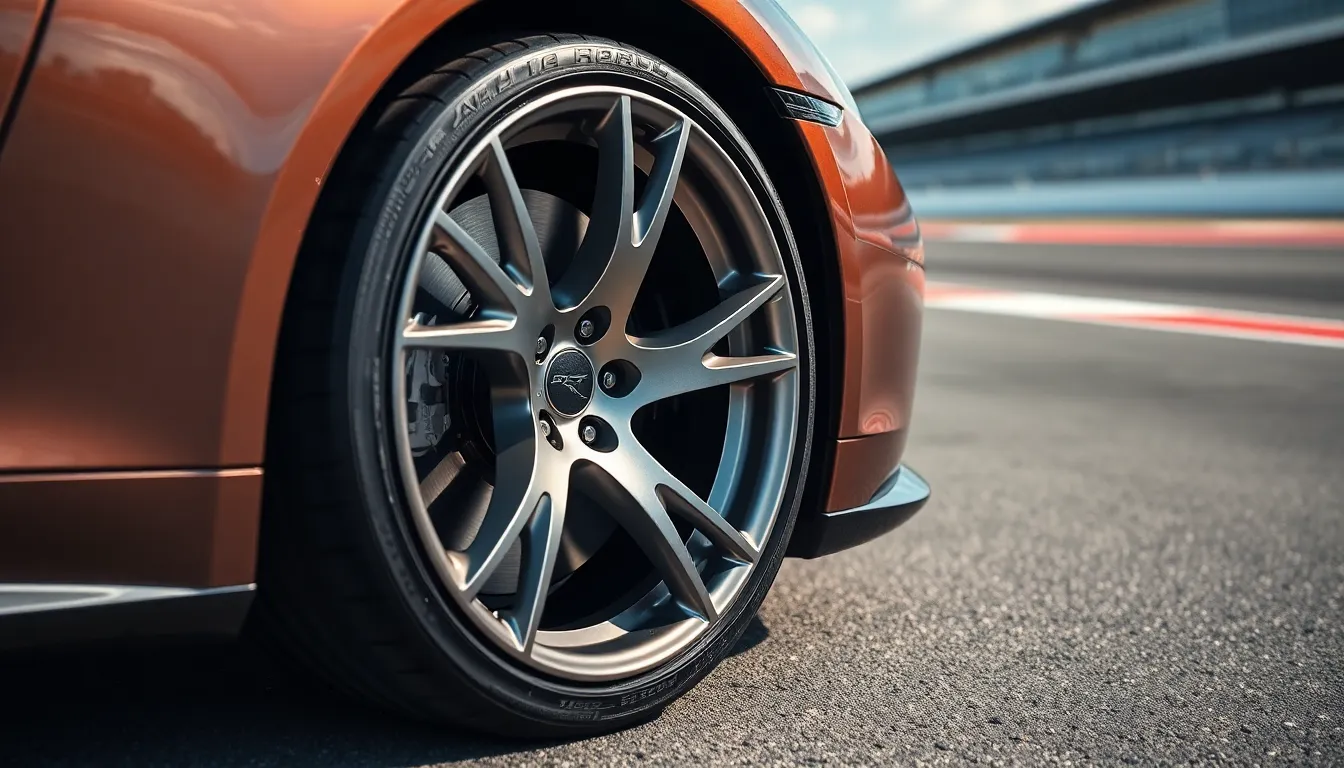When we’re shopping for wheels to upgrade our vehicles, we often come across the term “premium wheels” and wonder what makes them worth the extra investment. These high-end wheel options go far beyond basic transportation needs – they’re engineered to deliver superior performance, stunning aesthetics, and long-lasting durability that transforms both how our cars look and drive.
Premium wheels represent the pinnacle of automotive wheel technology, combining advanced materials like forged aluminum and carbon fiber with precision manufacturing processes. We’ll discover how these wheels differ from standard options through their lightweight construction, enhanced strength, and meticulous attention to detail that elevates every aspect of our driving experience.
Understanding what makes wheels “premium” helps us make informed decisions about upgrading our vehicles. From improved handling and fuel efficiency to eye-catching designs that turn heads, premium wheels offer benefits that extend far beyond their striking appearance – they’re an investment in performance, safety, and style that we’ll appreciate every time we hit the road.
What Are Premium Wheels
Premium wheels represent the pinnacle of automotive engineering where cutting-edge materials meet precision manufacturing techniques. These sophisticated components elevate vehicle performance through advanced alloy compositions including forged aluminum, carbon fiber, and magnesium variants that deliver superior strength-to-weight ratios.
Manufacturing processes for premium wheels involve multiple precision techniques that distinguish them from standard options:
- Forging creates wheels through high-pressure compression that aligns metal grain structure
- Flow forming stretches aluminum under heat and pressure for enhanced strength
- Multi-piece construction allows customization of barrel depths and offset specifications
- CNC machining ensures exact tolerances within 0.1mm accuracy standards
Material composition defines premium wheel characteristics across different performance categories. Forged aluminum wheels weigh 20-30% less than cast alternatives while maintaining 2-3 times greater impact resistance. Carbon fiber variants reduce unsprung weight by up to 40% compared to traditional alloy options though they command premium pricing between $2,000-$8,000 per wheel.
Design aesthetics separate premium wheels through distinctive visual elements including split-spoke patterns, deep concave profiles, and custom finish options. Surface treatments cover powder coating, anodizing, and PVD coating processes that provide both protection and visual appeal lasting 5-10 years under normal driving conditions.
Performance benefits manifest through reduced rotational mass that improves acceleration by 0.2-0.5 seconds in 0-60 mph testing. Enhanced heat dissipation properties of premium materials allow brake temperatures to remain 50-100 degrees Fahrenheit cooler during aggressive driving scenarios. Improved rigidity translates to sharper steering response and reduced deflection under cornering loads exceeding 1.2g lateral acceleration.
Quality standards for premium wheels exceed OEM specifications through rigorous testing protocols including impact resistance, fatigue cycling, and corrosion resistance evaluations. Certification bodies like TÜV and JWL verify structural integrity through standardized procedures that simulate 100,000 miles of driving conditions.
Key Characteristics of Premium Wheels
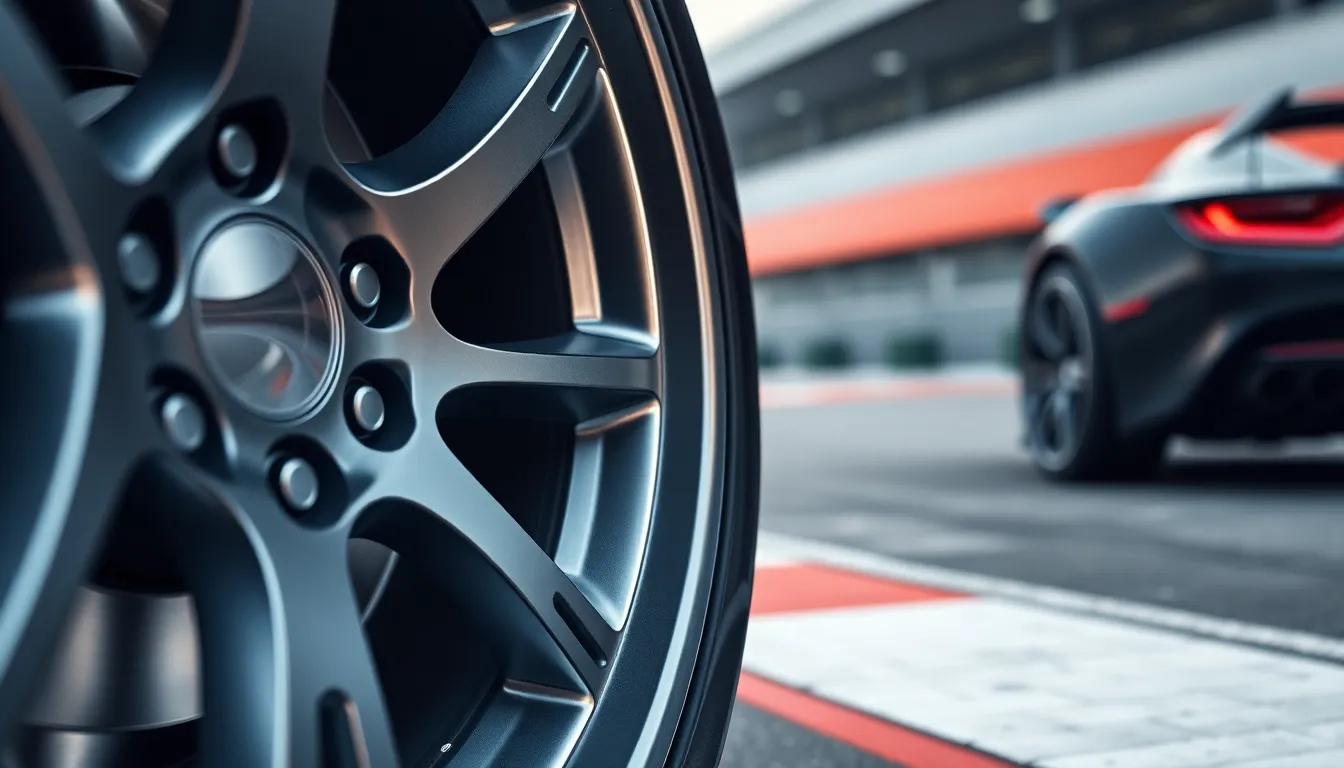
Premium wheels distinguish themselves through exact attributes that set them apart from standard factory options. We identify three fundamental characteristics that define their superior quality and performance capabilities.
Superior Materials and Construction
Forged aluminum serves as the primary material choice for premium wheels, offering 20-30% weight reduction compared to cast alternatives. Magnesium alloys provide even greater weight savings while maintaining structural integrity under extreme conditions. High-strength steel construction delivers maximum durability for heavy-duty applications where aluminum might not suffice.
Carbon fiber wheels represent the pinnacle of lightweight construction, reducing unsprung weight by up to 40% compared to traditional materials. These advanced composites resist corrosion and provide exceptional strength-to-weight ratios that directly translate to improved vehicle dynamics.
Multi-piece construction allows manufacturers to combine different materials strategically, placing aluminum centers with steel outer rings for optimal performance characteristics. This approach maximizes each material’s strengths while minimizing weaknesses inherent in single-piece designs.
Advanced Manufacturing Processes
Forging creates denser wheel structures through extreme pressure application, resulting in grain flow patterns that enhance strength throughout the entire wheel. Flow forming technology stretches and compresses the barrel section to achieve thinner walls without compromising structural integrity.
CNC machining ensures precise tolerances and perfect fitment across all mounting surfaces and spoke profiles. This computer-controlled process eliminates variations that occur in traditional casting methods, delivering consistent quality across production runs.
Heat treatment processes optimize material properties by relieving internal stresses and improving fatigue resistance. These thermal cycles enhance the wheel’s ability to withstand repeated loading cycles during aggressive driving conditions.
Enhanced Performance Features
Reduced rotational mass improves acceleration times by decreasing the energy required to spin the wheels during launches. Lighter wheels transfer less inertia to the drivetrain, allowing engines to respond more quickly to throttle inputs.
Enhanced heat dissipation capabilities keep brake temperatures cooler through improved airflow designs and thermal conductivity properties. Spoke patterns optimize air circulation around brake components, preventing heat buildup during repeated hard braking sessions.
Aerodynamic enhancements reduce drag coefficients and improve fuel efficiency through carefully designed spoke profiles and rim shapes. These features work together to minimize air turbulence around the wheel wells while maintaining structural requirements for safety and performance.
Types of Premium Wheels
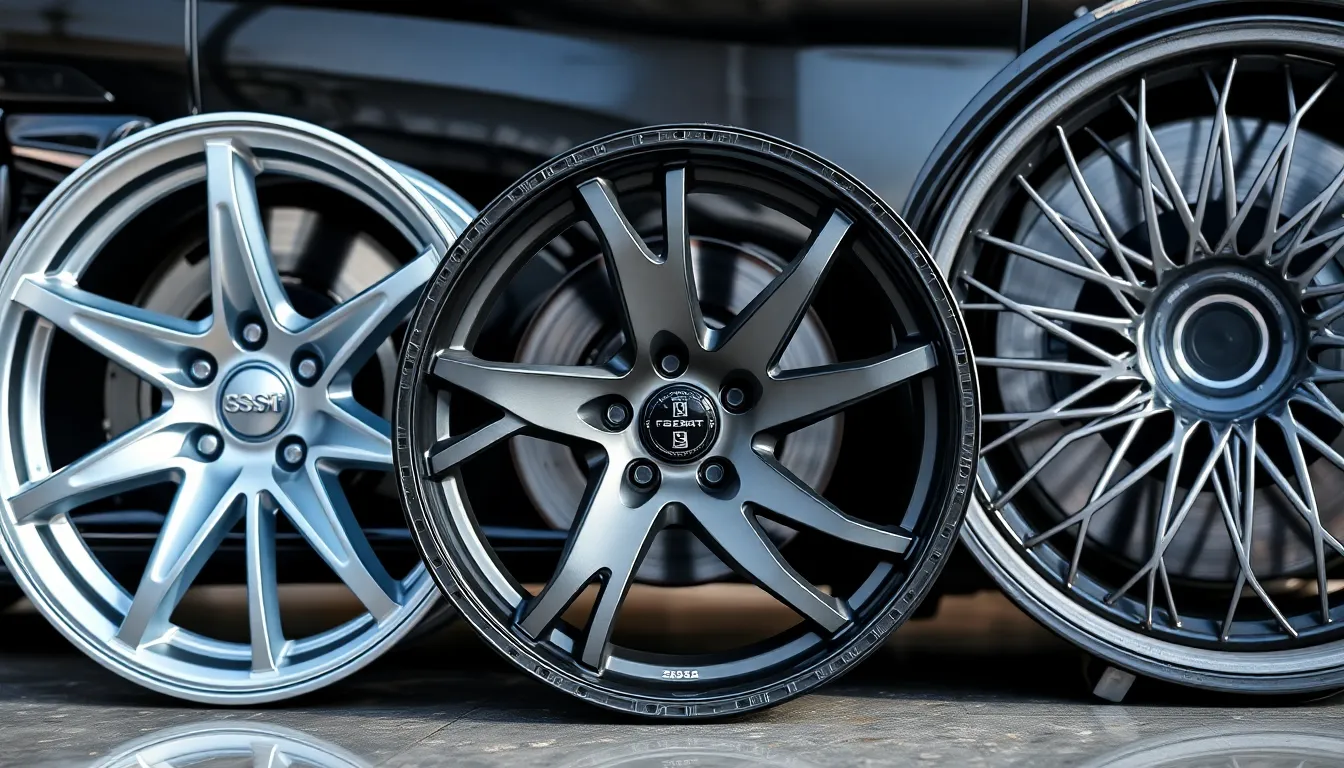
Premium wheels cover several distinct categories that cater to different performance requirements and budgets. Each type offers unique manufacturing processes and material compositions that deliver exact advantages for various driving applications.
Forged Wheels
Forged wheels represent the pinnacle of strength and lightweight construction in premium wheel manufacturing. These wheels use high-strength alloys like aluminum or magnesium through a manufacturing process that creates a denser and stronger wheel structure compared to traditional casting methods. The forging process compresses the metal under extreme pressure, resulting in superior grain flow and structural integrity.
Manufacturing begins with a solid aluminum billet that gets heated and pressed into shape using hydraulic presses applying thousands of tons of force. This process eliminates air pockets and creates a uniform grain structure throughout the wheel. Forged aluminum wheels typically weigh 20-30% less than their cast counterparts while maintaining exceptional strength characteristics.
Performance benefits include reduced unsprung weight that improves acceleration, braking response, and suspension performance. The lightweight construction reduces rotational mass, allowing engines to rev more freely and transmissions to shift more efficiently. Racing teams and performance enthusiasts prefer forged wheels because they withstand extreme stress without compromising structural integrity.
Carbon Fiber Wheels
Carbon fiber wheels offer the ultimate in lightweight construction and strength-to-weight ratio optimization. These wheels combine carbon fiber layers with resin systems to create structures that weigh significantly less than traditional metal alternatives. Manufacturing involves laying carbon fiber sheets in exact orientations and curing them under heat and pressure to form the final wheel shape.
Weight reduction reaches up to 40% compared to aluminum wheels, making carbon fiber the lightest premium wheel option available. The material’s inherent properties provide excellent vibration damping characteristics that enhance ride quality and reduce road noise transmission. High-performance applications benefit from the superior heat dissipation properties that keep brake components cooler during aggressive driving.
Cost factors make carbon fiber wheels the most expensive premium option, with prices often exceeding $5,000 per wheel for high-end applications. Motorsports teams and exotic car manufacturers frequently specify carbon fiber wheels for their exceptional performance characteristics and weight savings benefits.
High-End Cast Wheels
High-end cast wheels bridge the gap between standard OEM wheels and premium forged alternatives through advanced casting techniques and superior materials. These wheels feature intricate designs and custom finishes that weren’t possible with traditional casting methods. Low-pressure casting and flow forming processes enhance the structural properties while maintaining cost effectiveness.
Flow forming technology stretches and compresses the wheel barrel after initial casting, creating grain structures similar to forged wheels in exact areas. This hybrid approach delivers improved strength characteristics at approximately 60% of forged wheel costs. Advanced alloy compositions incorporate titanium and other strengthening elements that enhance durability without important weight penalties.
Design flexibility allows manufacturers to create complex spoke patterns and deep concave profiles that enhance vehicle aesthetics. Surface treatments include powder coating, anodizing, and specialized finishes that resist corrosion and maintain appearance over extended periods. Automotive enthusiasts often choose high-end cast wheels for their balance of performance improvements and visual appeal at accessible price points.
Benefits of Premium Wheels Over Standard Options
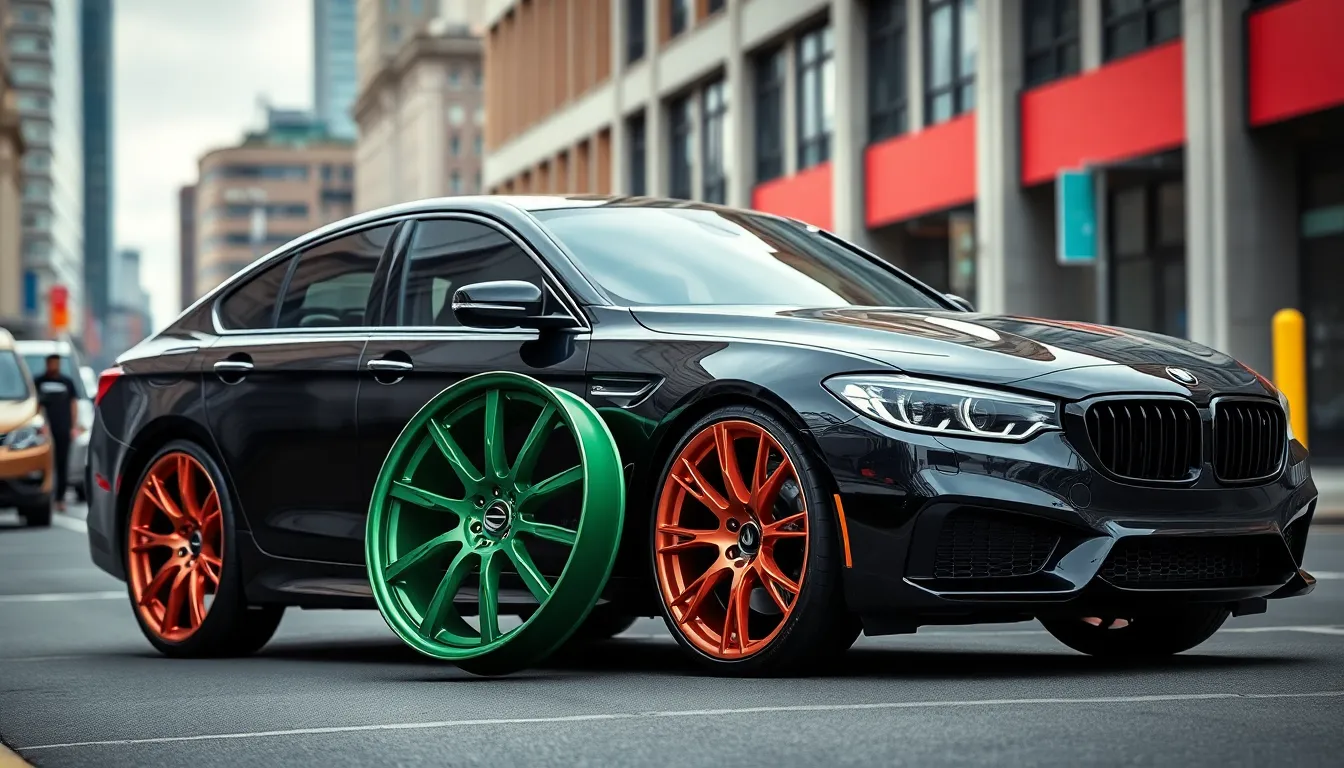
Premium wheels deliver measurable improvements across three critical areas that transform your driving experience. We examine how these advanced wheels outperform standard options through enhanced performance capabilities, striking visual appeal, and superior longevity.
Performance Advantages
Lightweight construction stands as the primary performance benefit premium wheels offer over standard alternatives. Premium wheels reduce unsprung weight, which directly improves handling response, acceleration times, and fuel efficiency throughout your vehicle’s operation.
Enhanced aerodynamics represent another important advantage premium wheels provide. Innovative spoke designs improve brake heat dissipation while optimizing airflow around the wheel assembly, creating better overall vehicle performance during demanding driving conditions.
Better brake performance emerges from the advanced materials and precise engineering premium wheels use. The superior heat dissipation properties of forged aluminum, magnesium alloy, and carbon fiber materials prevent brake fade while maintaining consistent stopping power even during aggressive driving scenarios.
Improved tire grip results from the enhanced structural rigidity premium wheels deliver. This increased stiffness transfers road feedback more effectively to the suspension system, allowing drivers to experience better cornering stability and more precise steering response.
Aesthetic Appeal
Custom finishes distinguish premium wheels from standard options through polished, painted, or machined surfaces that enhance your vehicle’s visual impact. These specialized surface treatments create unique styling opportunities that standard wheels cannot match.
Exclusivity defines many premium wheel offerings through limited production runs that appeal to car enthusiasts seeking distinctive appearances. Manufacturers often produce these wheels in smaller quantities, ensuring your vehicle maintains a unique presence on the road.
Design innovation characterizes premium wheels through complex spoke patterns, multi piece constructions, and aerodynamic profiles that complement modern vehicle aesthetics. These advanced designs create visual depth and sophistication that standard cast wheels cannot achieve.
Color customization options expand significantly with premium wheels, offering powder coating, anodizing, and specialized finishes in virtually unlimited color combinations. This flexibility allows owners to perfectly match their wheels to their vehicle’s color scheme or create striking contrast effects.
Durability and Longevity
Stronger materials form the foundation of premium wheel durability, with forged aluminum providing significantly greater strength than cast aluminum alternatives. Magnesium alloy and carbon fiber wheels offer even greater weight reduction while maintaining superior structural integrity over extended use periods.
Resistance to damage characterizes premium wheels through their advanced material compositions and manufacturing processes. These wheels withstand impacts, corrosion, and thermal cycling better than standard options, maintaining their structural integrity and appearance over longer service lives.
Precision manufacturing ensures premium wheels meet tighter tolerances and higher quality standards than standard wheels. This attention to detail during production reduces the likelihood of manufacturing defects while improving overall wheel balance and performance consistency.
Advanced testing protocols validate premium wheel durability through rigorous certification processes that exceed OEM specifications. Organizations like TÜV and JWL verify these wheels can withstand extreme conditions while maintaining their structural integrity throughout their operational lifespan.
Top Premium Wheel Brands and Manufacturers
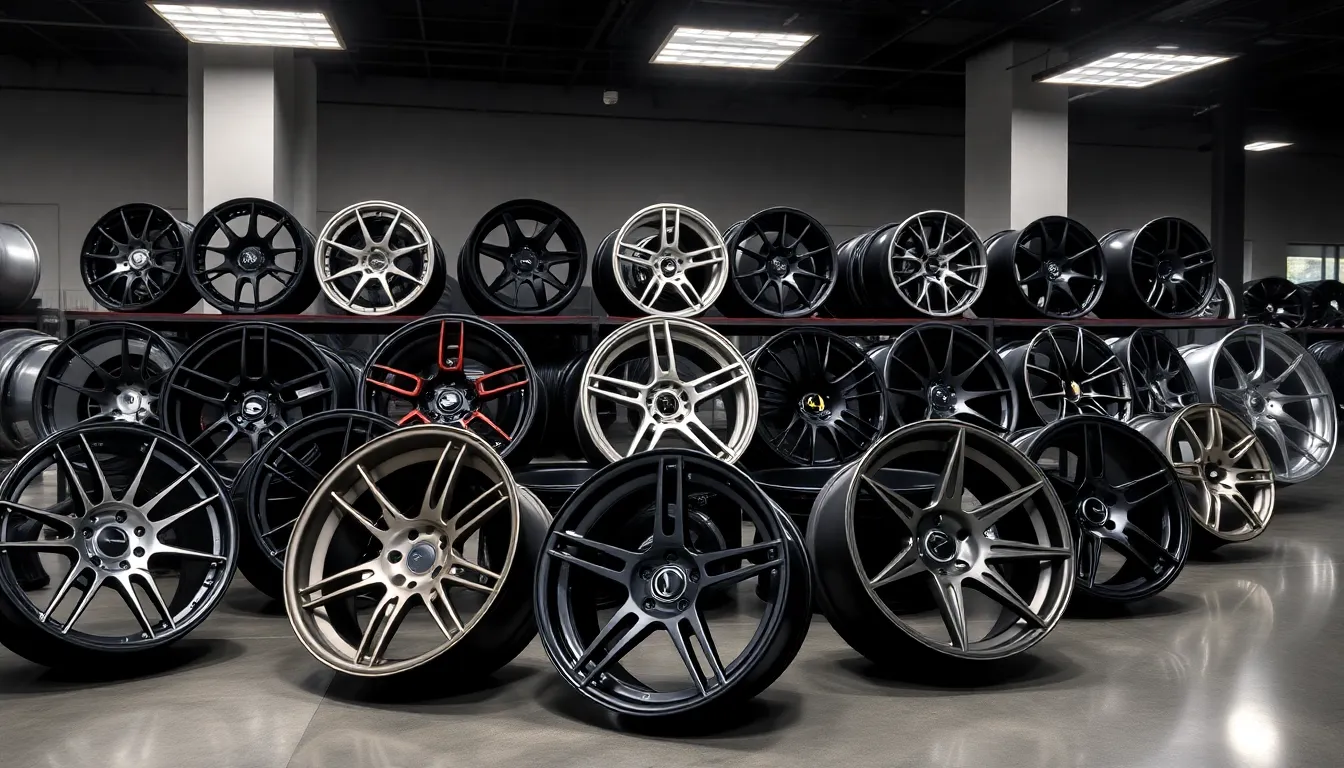
Premium wheel manufacturers distinguish themselves through decades of motorsport heritage and engineering excellence. We’ve identified eight leading brands that consistently deliver exceptional quality and performance in the luxury wheel market.
BBS leads the industry with forged and cast wheel technologies that dominate motorsport applications. Their wheels feature prominently on luxury vehicles and racing circuits worldwide, establishing them as the benchmark for premium construction standards.
OZ Racing specializes in alloy wheels engineered for performance and racing environments. Racing teams across Formula 1 and rally championships rely on their lightweight designs that enhance vehicle dynamics through superior strength-to-weight ratios.
HRE Wheels creates custom forged wheels that represent the pinnacle of personalized luxury. Each wheel undergoes precision manufacturing processes that deliver unique aesthetic designs while maintaining structural integrity for high-performance applications.
Vossen Wheels combines luxury aesthetics with performance engineering through their custom finish options. Their design portfolio spans multiple vehicle categories, offering everything from subtle elegance to bold statement pieces that transform vehicle appearance.
Forgiato focuses exclusively on luxury custom wheels that cater to show-quality applications. Their forged construction methods produce wheels that serve as centerpieces for high-end automotive builds and luxury vehicle modifications.
VS Forged manufactures bespoke custom wheels that emphasize individual customer requirements. Each wheel receives personalized attention during the design and manufacturing process, resulting in truly unique products that reflect owner preferences.
Enkei produces lightweight performance wheels that serve diverse automotive applications. Their manufacturing expertise spans from everyday performance vehicles to specialized racing applications, delivering consistent quality across their entire product range.
Work Wheels offers premium forged and cast options for tuning enthusiasts and luxury car owners. Japanese precision manufacturing techniques ensure their wheels meet the demanding requirements of both street performance and track applications.
| Brand | Specialization | Primary Applications |
|---|---|---|
| BBS | Forged/Cast Technology | Motorsport, Luxury Vehicles |
| OZ Racing | Performance Alloys | Racing, High-Performance |
| HRE Wheels | Custom Forged | Luxury, Personalization |
| Vossen Wheels | Luxury Performance | Custom Finishes, Multiple Categories |
| Forgiato | Show Quality | Luxury Custom, Modifications |
| VS Forged | Bespoke Custom | Individual Requirements |
| Enkei | Lightweight Performance | Diverse Applications |
| Work Wheels | Precision Manufacturing | Tuning, Luxury Cars |
These manufacturers invest heavily in research and development to maintain their competitive advantages. Innovation drives their product development cycles, resulting in continuous improvements to materials, manufacturing processes, and design capabilities that benefit automotive enthusiasts seeking premium wheel answers.
Cost Considerations for Premium Wheels
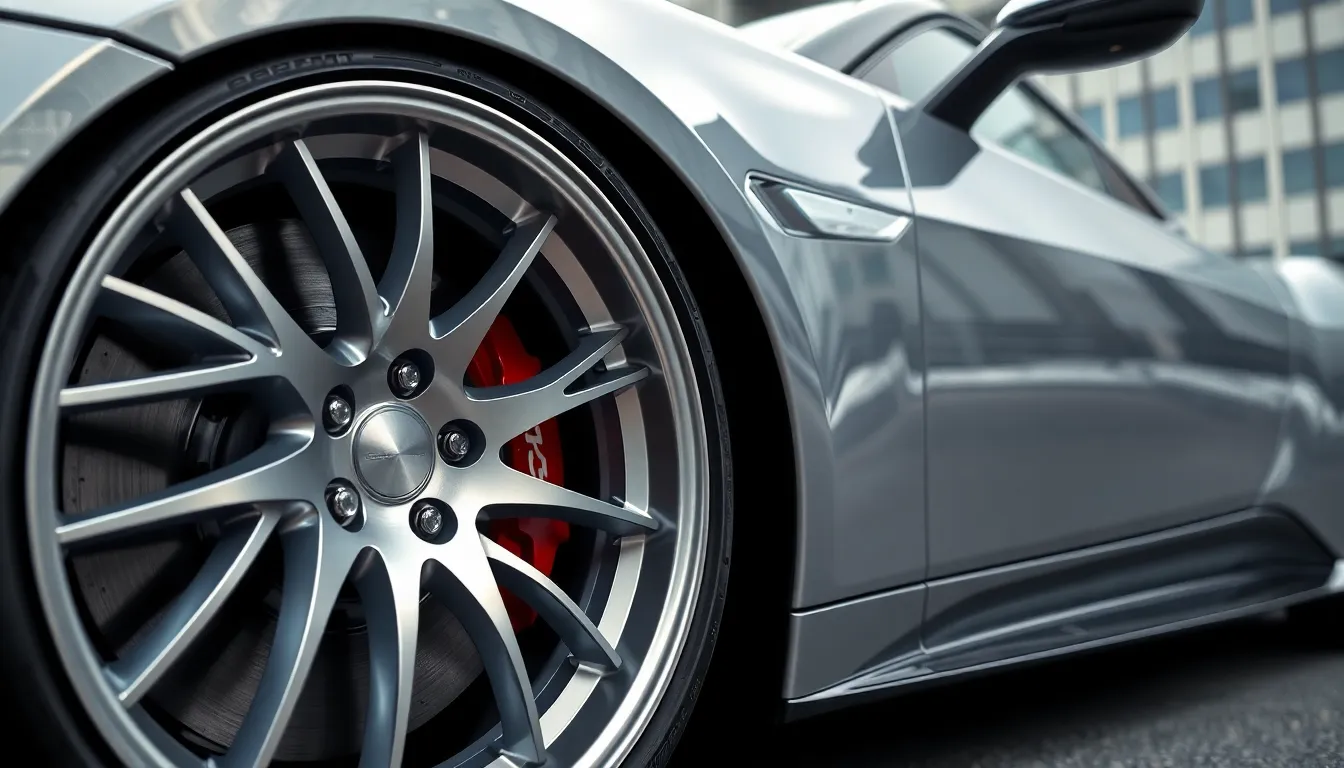
Premium wheels represent a important investment that varies dramatically based on materials, manufacturing processes, and brand positioning. Understanding these cost factors helps buyers make informed decisions about upgrading their vehicle’s wheels.
Price Range and Factors
Premium wheel pricing spans from $500 to $5,000+ per wheel depending on construction methods and materials. Forged aluminum wheels typically cost 2-3 times more than high-end cast alternatives due to their superior strength and 20-30% weight reduction. Carbon fiber wheels command the highest prices, often exceeding $3,000 per wheel, reflecting their 40% weight savings and advanced manufacturing requirements.
Manufacturing complexity drives important cost variations within premium categories. Multi-piece construction increases prices by 25-40% compared to monoblock designs due to additional assembly processes and specialized hardware. CNC machining adds precision but increases costs by 15-20% over standard finishing techniques. Limited production runs from boutique manufacturers like HRE Wheels and Forgiato create exclusivity premiums of 30-50% above mass-produced alternatives.
Brand reputation significantly impacts pricing structures across premium wheel markets. Established motorsport brands like BBS and OZ Racing command premium pricing based on decades of racing heritage and proven performance. Emerging brands often offer competitive pricing to gain market share while maintaining quality standards. Custom finishes, specialized coatings, and personalization options add $200-800 per wheel to base pricing.
Value Proposition
Premium wheels deliver measurable performance improvements that justify their higher costs for driving enthusiasts. Weight reduction from forged aluminum construction improves acceleration times by 0.1-0.3 seconds in quarter-mile runs while reducing fuel consumption by 2-4%. Enhanced brake cooling through optimized spoke designs prevents brake fade during aggressive driving, improving safety margins significantly.
Durability advantages create long-term value through extended service life and reduced maintenance costs. Premium wheels typically last 2-3 times longer than standard alternatives due to superior materials and precision manufacturing. Forged construction resists impact damage better than cast wheels, reducing replacement frequency in harsh driving conditions. Advanced corrosion resistance treatments protect finish integrity for 5-7 years compared to 2-3 years for standard wheels.
Resale value preservation makes premium wheels attractive investments for vehicle owners. Quality premium wheels retain 60-70% of their original value after three years compared to 30-40% for standard alternatives. Popular brands like Vossen Wheels and Enkei maintain strong secondary markets due to proven reliability and aesthetic appeal. Complete wheel packages often transfer to new vehicles, extending their utility beyond single ownership periods.
How to Choose the Right Premium Wheels
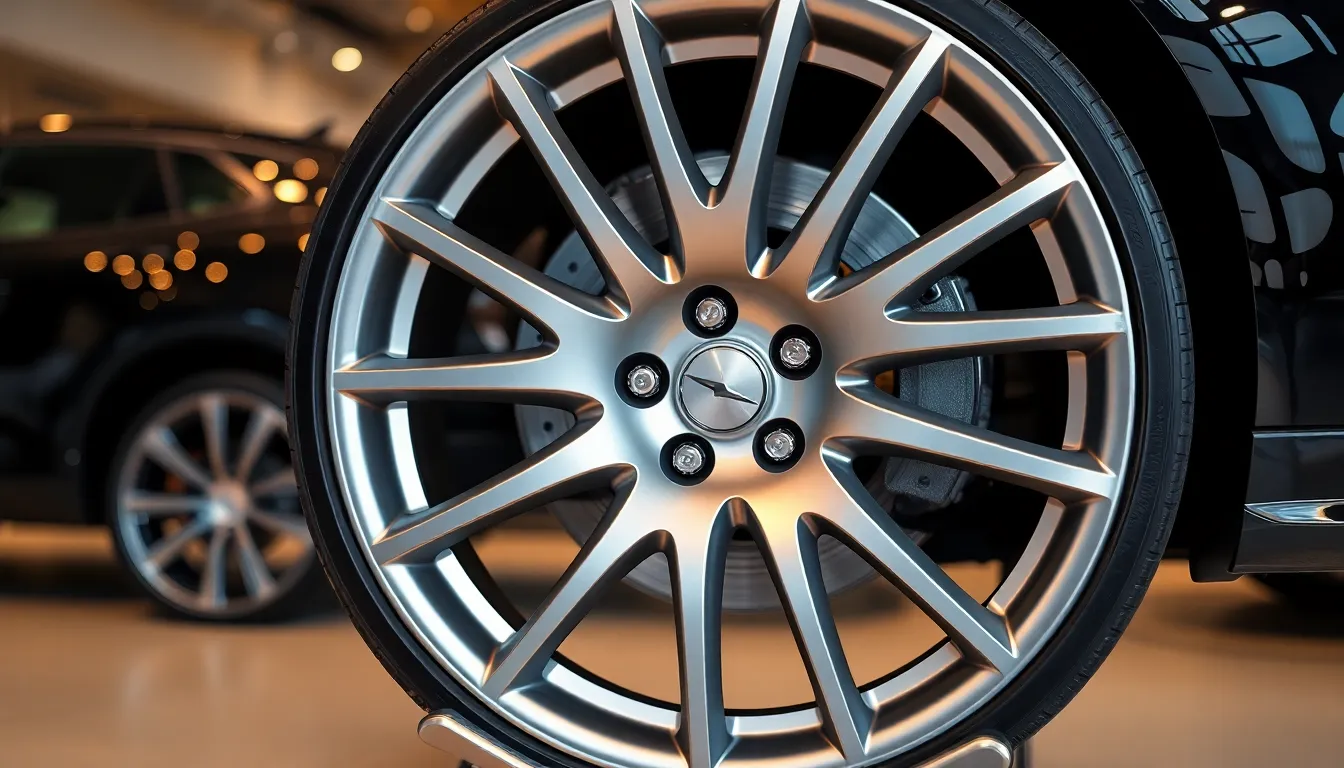
Selecting premium wheels requires matching technical specifications to your vehicle while aligning features with your driving needs. We’ve identified the critical factors that determine the best premium wheel choice for your exact requirements.
Vehicle Compatibility
Vehicle compatibility forms the foundation of premium wheel selection and prevents costly mistakes that compromise safety and performance. We recommend verifying your vehicle’s bolt pattern (PCD), which varies significantly across manufacturers and models. Most vehicles use common patterns like 5×114.3mm or 5x120mm, though luxury brands often employ unique specifications.
Wheel diameter directly impacts your vehicle’s handling characteristics and ride quality. Larger diameters between 18-22 inches provide enhanced cornering response but reduce comfort on rough surfaces. Width measurements affect tire contact patches and steering precision, with performance vehicles benefiting from wider fitments between 9-12 inches.
Offset specifications determine how wheels sit within your wheel wells and affect suspension geometry. Positive offset pushes wheels inward while negative offset creates a more aggressive stance. Installing wheels with incorrect offset can cause rubbing issues and alter your vehicle’s handling dynamics.
Load ratings ensure your premium wheels can safely support your vehicle’s weight under various conditions. We verify that forged aluminum wheels typically exceed OEM load requirements by 20-30%, providing additional safety margins for performance driving.
Driving Style and Intended Use
Driving style considerations determine which premium wheel characteristics deliver optimal performance for your exact applications. Performance enthusiasts benefit from lightweight forged construction that reduces unsprung weight by 15-25% compared to standard wheels. This weight reduction improves acceleration times and enhances suspension responsiveness during aggressive cornering.
Daily driving applications prioritize durability and comfort over maximum weight savings. High-end cast wheels offer improved aesthetics and moderate weight reduction while maintaining ride quality on various road surfaces. These wheels typically cost 40-60% less than forged alternatives while providing substantial upgrades over factory options.
Track and motorsport use demands maximum strength and heat dissipation capabilities. Carbon fiber wheels excel in these applications, reducing rotational mass by up to 40% while withstanding extreme temperatures. Their superior heat dissipation keeps brake components cooler during sustained high-performance driving sessions.
Off-road and rugged terrain applications require robust construction that resists impact damage. Forged aluminum wheels with reinforced spoke designs handle harsh conditions better than lightweight alternatives. We recommend choosing wheels with protective finishes that resist corrosion and maintain appearance even though exposure to dirt and debris.
Material selection impacts both performance and longevity across different driving scenarios. Magnesium alloys provide exceptional weight savings for racing applications but require more maintenance than aluminum alternatives. Forged aluminum offers the best balance of strength, weight, and durability for most performance-oriented drivers.
Maintenance and Care for Premium Wheels
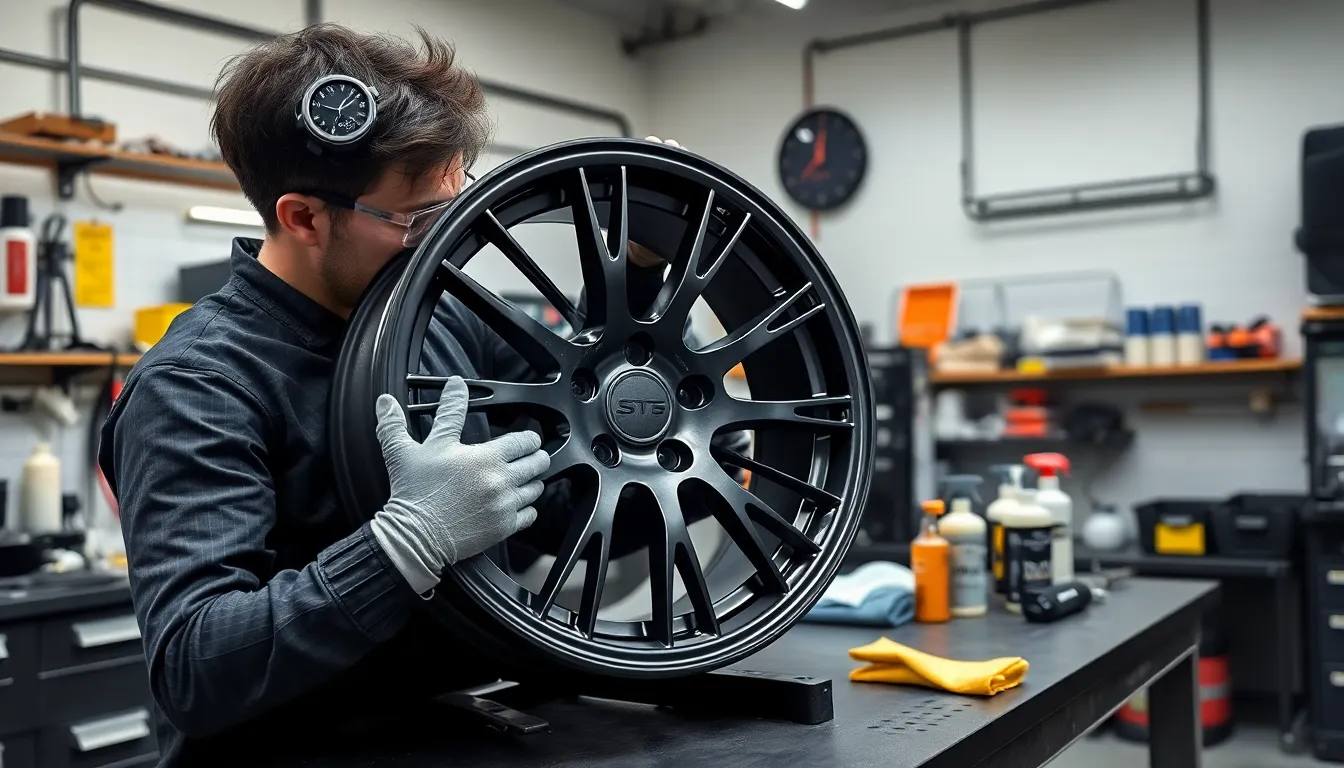
Premium wheel maintenance requires consistent attention to preserve their performance characteristics and aesthetic appeal. Regular cleaning with pH-neutral wheel cleaners prevents brake dust accumulation and maintains the integrity of specialized finishes like powder coating and anodized surfaces.
Gentle cleaning products specifically formulated for premium wheel materials protect against corrosion and finish degradation. Microfiber cloths and soft-bristled brushes remove contaminants without scratching delicate surfaces. Avoiding harsh chemicals like bleach or acidic cleaners extends the lifespan of premium wheel coatings significantly.
Weekly inspections detect early signs of damage including hairline cracks, bent rim edges, or finish imperfections that could compromise structural integrity. Visual checks around spoke junctions and rim flanges identify stress points where failures typically originate. Professional inspection every 6 months ensures optimal safety standards for high-performance applications.
Proper storage prevents damage during seasonal tire changes and long-term storage periods. Premium wheels require flat horizontal positioning or specialized wheel racks that distribute weight evenly across the rim structure. Avoiding direct contact with concrete floors protects against moisture absorption and corrosion initiation.
| Maintenance Task | Frequency | Recommended Products |
|---|---|---|
| Cleaning | Weekly | pH-neutral wheel cleaners |
| Detailed inspection | Monthly | Visual assessment tools |
| Professional check | Every 6 months | Certified technician |
| Storage preparation | Seasonal | Protective covers, racks |
Temperature cycling protection maintains the dimensional stability of forged aluminum and magnesium alloy wheels during extreme weather conditions. Gradual temperature changes prevent thermal stress that can lead to spoke fatigue or rim distortion. Climate-controlled storage environments optimize long-term preservation for premium wheel investments.
Torque specifications require precise adherence during installation and maintenance procedures. Premium wheels often feature exact torque values that differ from standard wheel requirements due to their advanced materials and construction methods. Using calibrated torque wrenches ensures proper mounting without over-stressing the wheel structure.
Regular balancing maintains optimal performance characteristics and prevents premature tire wear on premium wheel setups. Ever-changing balancing every 10,000 miles compensates for weight distribution changes and maintains the precision engineering advantages of premium wheel construction.
Conclusion
Premium wheels represent a important upgrade that transforms both your vehicle’s performance and appearance. With advanced materials like forged aluminum and carbon fiber combined with precision manufacturing we’ve explored how these wheels deliver measurable improvements in acceleration handling and fuel efficiency.
The investment in premium wheels extends beyond immediate performance gains. Their superior durability and resistance to damage ensure long-term value while their striking designs and custom finishes elevate your vehicle’s aesthetic appeal. Whether you choose forged aluminum for balanced performance or carbon fiber for maximum weight reduction each option offers distinct advantages.
Selecting the right premium wheels requires careful consideration of your driving needs technical specifications and budget. With proper maintenance and care these wheels will continue delivering exceptional performance while maintaining their visual appeal for years to come making them a worthwhile investment for any automotive enthusiast.
Frequently Asked Questions
What are premium wheels and how do they differ from standard wheels?
Premium wheels are high-performance vehicle upgrades made from advanced materials like forged aluminum, magnesium alloys, or carbon fiber. They differ from standard wheels through superior manufacturing processes including forging, flow forming, and CNC machining. These wheels offer significant weight reductions (20-40% lighter), improved strength-to-weight ratios, enhanced aesthetics with custom finishes, and better performance characteristics compared to factory wheels.
What materials are used in premium wheel construction?
Premium wheels utilize three main materials: forged aluminum (offering 20-30% weight savings), magnesium alloys (providing maximum weight reduction for racing applications), and carbon fiber (reducing unsprung weight by up to 40%). These advanced materials are combined with precision manufacturing techniques like forging, flow forming, and multi-piece construction to optimize strength, weight, and performance characteristics.
How much do premium wheels typically cost?
Premium wheel prices range from $500 to over $5,000 per wheel, depending on materials, manufacturing complexity, and brand reputation. Forged aluminum wheels cost 2-3 times more than high-end cast alternatives. Carbon fiber wheels command the highest prices due to advanced manufacturing processes. While expensive, premium wheels offer strong resale value and measurable performance benefits that justify the investment.
What are the main performance benefits of premium wheels?
Premium wheels provide several performance advantages: reduced rotational mass improves acceleration and handling, enhanced heat dissipation keeps brakes cooler during aggressive driving, better aerodynamics increase fuel efficiency, and optimized spoke patterns improve overall vehicle dynamics. The lightweight construction also reduces unsprung weight, resulting in better suspension response and improved ride quality.
Which brands are considered top premium wheel manufacturers?
Leading premium wheel brands include BBS, OZ Racing, HRE Wheels, Vossen Wheels, Forgiato, VS Forged, Enkei, and Work Wheels. These manufacturers are known for their motorsport heritage, engineering excellence, and commitment to quality. Each brand specializes in different aspects, from forged and cast technologies to custom designs, catering to various performance requirements and aesthetic preferences.
How do I choose the right premium wheels for my vehicle?
Selecting premium wheels requires matching technical specifications to your vehicle: verify bolt patterns, wheel diameter, width, offset specifications, and load ratings. Consider your driving style—lightweight forged wheels for performance driving, durable cast wheels for daily use. Match material selection to needs: magnesium for racing, forged aluminum for balanced performance, and ensure proper fitment for safety and optimal performance.
What maintenance do premium wheels require?
Premium wheels need regular care to maintain performance and appearance. Clean weekly with pH-neutral wheel cleaners and gentle products to protect specialized finishes. Conduct weekly visual inspections and professional checks every six months. Follow proper torque specifications during installation, store wheels correctly when not in use, and maintain regular balancing to optimize performance and prevent premature tire wear.
Are premium wheels worth the investment?
Premium wheels offer measurable benefits that justify their cost: improved performance through weight reduction and better aerodynamics, enhanced durability with stronger materials and precision manufacturing, superior aesthetics with custom finishes and exclusive designs, and strong resale value. For automotive enthusiasts seeking performance improvements and style upgrades, premium wheels represent a worthwhile long-term investment in vehicle enhancement.

